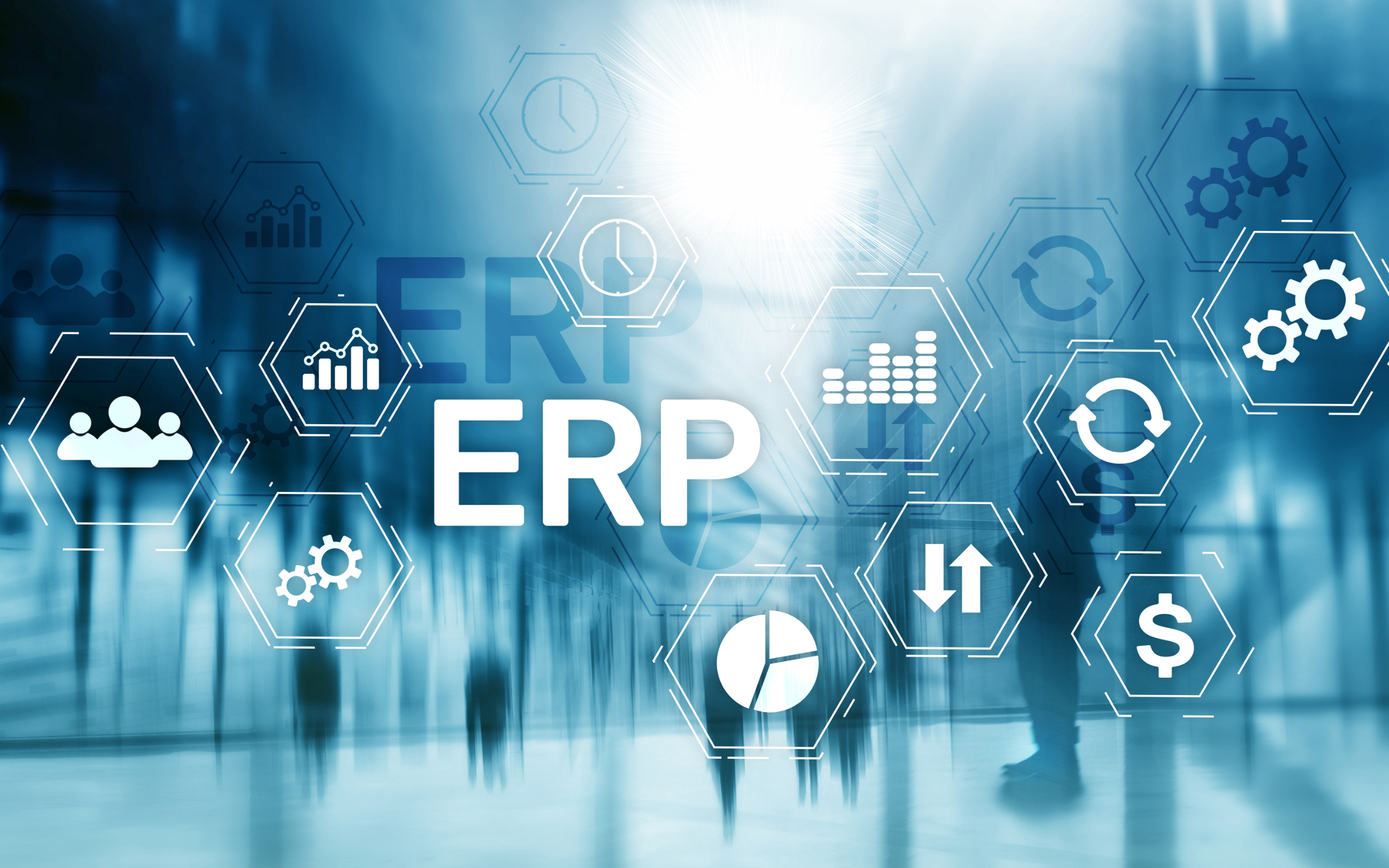Enterprise Resource Planning Software( ERP Software) is the brain of modern businesses, organizing and improving many operational processes. ERP systems integrate all areas of a company’s operations, streamlining workflows, increasing efficiency, and providing real-time data for decision-making. ERP consolidates data from finance, HR, supply chain management, manufacturing, and CRM onto a single platform for company-wide communication and cooperation.
Small and large enterprises need ERP software to manage resources, automate operations, and comply with industry laws. By eliminating silos and ensuring data consistency, ERP helps stakeholders anticipate challenges, seize opportunities, and adapt to changing market conditions.
With tailored modules for different sectors and business processes, ERP systems help firms optimize resource allocation, boost customer satisfaction, and succeed in today’s competitive climate. ERP is essential for agility, inventiveness, and resilience in a globalised market as companies evolve digitally.
What is Enterprise resource planning software?
ERP software is a complete set of connected applications that automates and manages enterprise business activities. Production, procurement, finance, HR, supply chain management, and customer relationship management are often involved.
ERP software centralizes all data and information related to these functions, allowing numerous departments to easily share information. ERP systems integrate data and automate activities to boost productivity, save costs, and improve decision-making.
ERP software often comprises modules for accounting, budgeting, human resource management (payroll and benefits), inventory management, production planning, sales and marketing, and reporting and analytics.
ERP software is highly customizable to meet the needs of numerous industries and businesses. Small, medium, and large companies use it to streamline operations, boost efficiency, and promote growth and scalability.
How does Enterprise Resource Planning Software work?
Enterprise Resource Planning (ERP) solutions integrate several business processes and functions into a single database and software platform, to make sure that the maximum benefit can be achieved.
The following are the steps which are taken or used to ensure the Enterprise Resource Planning (ERP) solutions work:
- Integration:
ERP software connects data and procedures from several departments and functions within a business. This integration breaks down data silos and ensures that information flows smoothly between departments like finance, human resources, supply chain management, production, and customer relationship management.
- Centralized Database:
ERP systems use a single database to hold all important data, including transactional data, customer information, inventory levels, personnel records, and financial data. This centralized database provides a single source of truth for the whole business, assuring data consistency and correctness.
- Modular Structure:
ERP software is often divided into modules or apps, each of which caters to a certain company function. These modules may cover finance and accounting, human resource management, procurement, inventory management, production planning, sales and marketing, and others. Organizations can select the components they require depending on their unique needs.
- Automation:
ERP systems automate routine operations and procedures including data input, reporting, and workflow approval. Automation simplified procedures, reduces manual mistakes, and increases productivity by allowing people to concentrate on more critical responsibilities.
- Real Time Visibility:
ERP software gives real-time visibility into numerous elements of the organization, allowing managers and decision-makers to access current information and insights as needed. This real-time information allows firms to make proactive decisions and adapt rapidly to changing market conditions and client demands.
- Customization
ERP systems are extremely configurable to match the specific demands and operations of many sectors and organizations. Organizations may customize the ERP software to meet their unique processes, business rules, and reporting needs.
- Scalability:
ERP solutions are meant to expand with the organization. ERP software can manage increased data quantities, users, and company complexity while maintaining performance and usefulness.
What makes the best ERP system?
ERP systems have many utilities and use cases, making ranking them difficult. Some include features for particular sectors, thus a product that works for one may not work for another. The factors that makes the best ERP systems are as follows:
- Top ERP systems offer integrated modules for various company functions, including finance, HR, supply chain, manufacturing, sales, and CRM. They support several sectors and business processes with their vast capabilities.
- A top-tier ERP system offers flexibility and customization to match an organization’s particular processes, business rules, and needs. It should be easy to adapt to company needs and market developments without bespoke development.
- Effective ERP systems require a user-friendly interface and simple navigation for widespread adoption and efficiency. Best ERP solutions are user-friendly, offering employees easy access to information and tools to execute their jobs.
- The best ERP systems can scale to handle increasing data quantities, user numbers, and business complexity as organizations grow. They should facilitate multi-site operations, international expansion, and third-party application integration.
The best 12 ERP software in 2024
1. SAP
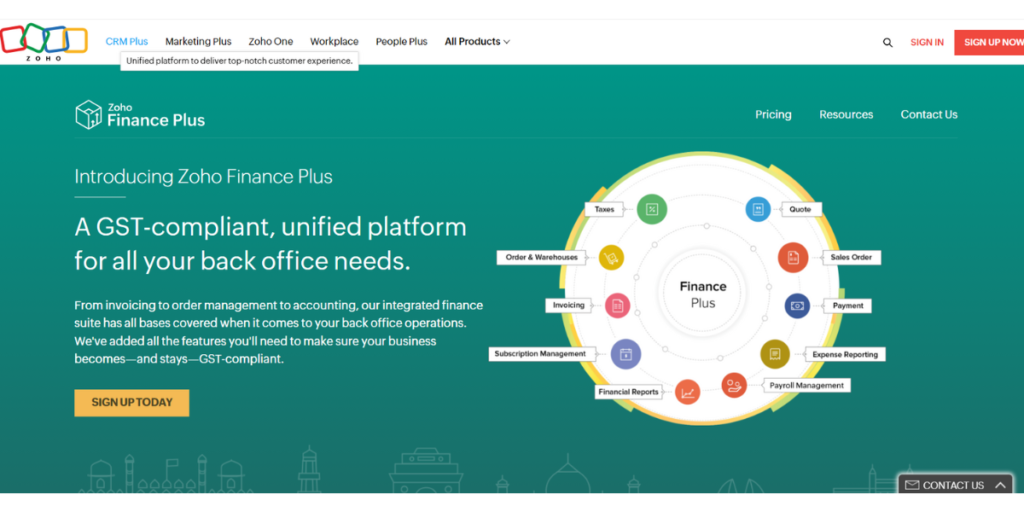
SAP S/4HANA Cloud Public Edition is a ready-to-use cloud ERP that incorporates the most recent industry best practices and constant innovation.
SAP ERP, created by German software company SAP SE, has been a major enterprise resource planning system since its establishment in 1972.
It connects fundamental business tasks to provide smooth operations across enterprises. SAP has developed with technical improvements, progressing from R/2 to R/3 and now SAP S/4HANA. The most recent edition, S/4HANA, has real-time analytics, cloud interoperability, and intelligent automation. Its most recent enhancements include improved sustainability integration, better compliance tools, and an emphasis on industry-specific business processes.
Key Features:
Adaptability to business models: SAP S/4HANA Cloud enables enterprises to seamlessly migrate from product-to-service-based models.
Industry-specific business processes: The ERP provides business procedures that are suited to diverse sectors.
Intelligent automation: SAP ERP optimizes operations by using intelligent automation across all operational activities.
Sustainability integration: Businesses can modify their operations and procedures in order to constantly minimize emissions, waste, and environmental impact.
Compliance and security: The built-in worldwide standards are constantly up to date.
Scalable Platform: SAP ERP provides a scalable platform with a network of partners, which adds fresh value to the system.
Pricing:
Professional license costs approximately $3,213/user/year or $108 per user/month.
2. Oracle Netsuite
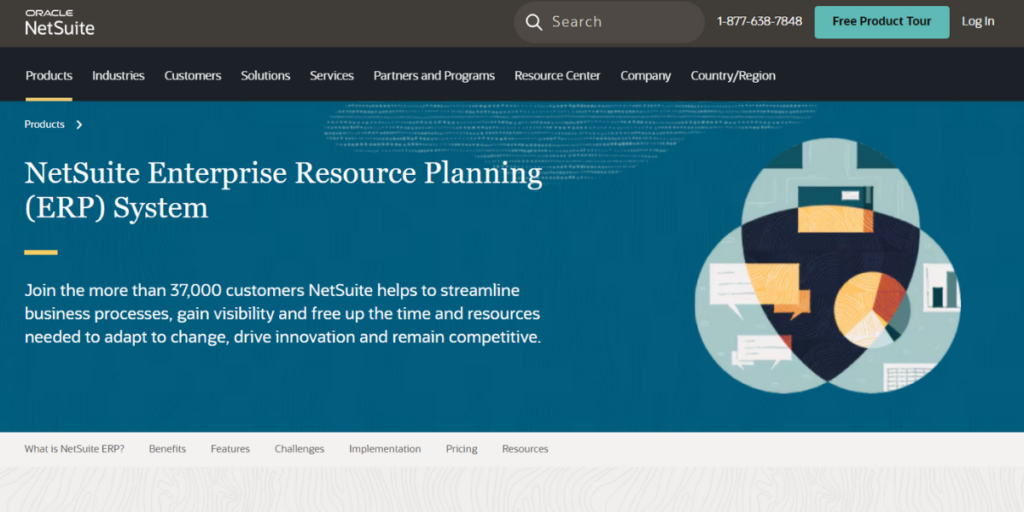
Oracle NetSuite ERP is a cloud-based company management package that combines ERP/Finance, CRM, and e-commerce capabilities.
NetSuite began in 1998 as a web-based accounting software and has grown to service over 36,000 clients worldwide. Since its acquisition by Oracle in 2016, Nesuite has provided a single platform for a wide range of corporate needs.
Newer features focus on worldwide company management, omnichannel commerce, and improved analytics and reporting. Users frequently praise the platform’s capacity to access data in real time and scale.
Key Features:
Unified suite: NetSuite provides a single package that includes ERP/finance, CRM, and e-commerce.
Global business management: Offers worldwide accounting and consolidation capabilities to provide uniform financial management across many geographies.
Omnichannel commerce: Enables e-commerce transactions for both B2C and B2B engagements.
Analytics and reporting: Provides in-depth analytics and reporting solutions for extracting meaningful insights from corporate data.
Human capital management: Manages human resources effectively by combining HR data with other business information.
Professional services automation: Organizes project management, resource management, and other professional services functions.
Pricing:
NetSuite SuiteSuccess packages are available in both Standard and Premium editions, with prices ranging from $1,299 to $9,999 per month.
3. Sage Business Cloud
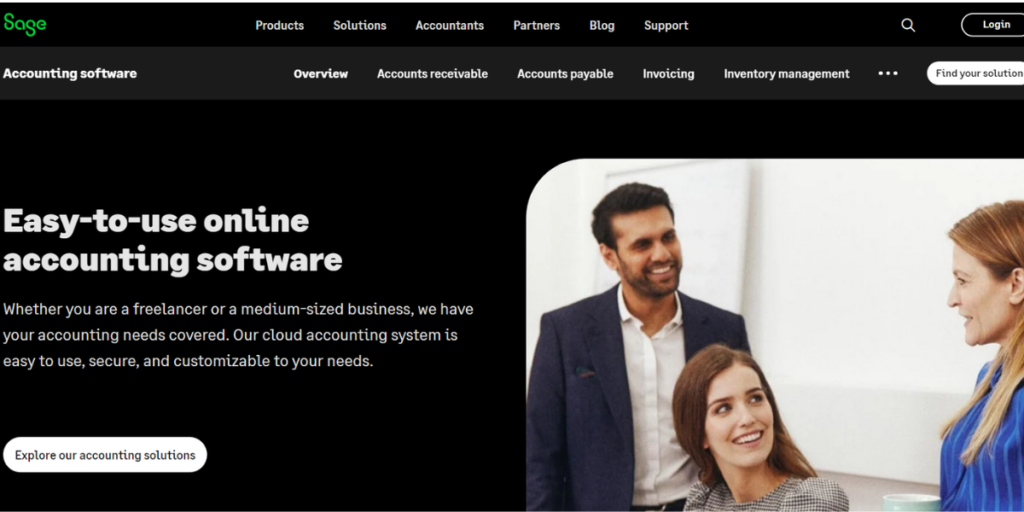
Sage ERP, currently known as Sage Business Cloud Enterprise Management, is an enterprise resource planning system with a long history, having grown from a modest UK-based company to a global software powerhouse. It has grown its capabilities over time to serve a wide range of sectors, from manufacturing to services, and has incorporated advanced AI-driven analytics, cloud integration, and mobile accessibility.
Key Features:
Supply chain management: The system provides a real-time overview of the complete supply chain.
Better operations management: It handles issues like margins, buying decisions, and ensuring optimal supplier performance and quality.
Warehouse and inventory management: The program includes capabilities that enable customers to comprehend all aspects of their inventory process, manage warehouse operations, order-to-cash, and calculate product profitability.
Mobile-optimized system: Because of its cloud deployment, the application is accessible via mobile devices.
Improved accounting: The program automates a variety of accounting operations, such as invoice generation, budget modifications, and revenue recognition.
Project management: It is facilitated by the system’s capabilities, which focus on project and budget tracking. It also gives project price and cost details.
Pricing:
An yearly Sage subscription begins at $24,000 before deployment.
Service estimates for Sage X3 implementation begin at $150,000. These are tailored to each project’s complexity. The entire implementation cost generally varies between $180,000 and $250,000. However, for more complicated projects, the costs may be much greater.
4. Microsoft Dynamics 365
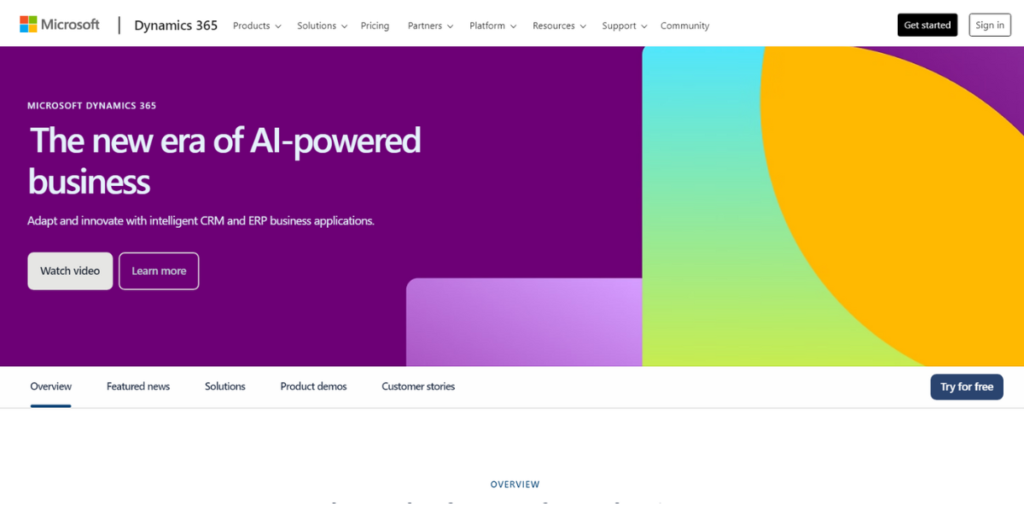
Microsoft Dynamics 365 ERP is an enterprise resource planning tool that is part of Microsoft’s larger Dynamics 365 platform. It is intended to consolidate corporate processes from finance, production, supply chain, operations, and retail into a single integrated system. Its cloud features provide real-time data access, enhanced analytics, and AI-driven insights.
The platform stands out for its seamless interaction with other Microsoft products, including Office 365, Power BI, and Azure, which creates a coherent environment for enterprises. Its modular design enables businesses to implement only the capabilities they require, expanding as they develop.
Key Features:
Global capabilities: Serves multinational corporations by monitoring country-specific compliance and tax regulations.
AI advances with Dynamics 365. Copilot: Provides powerful AI capabilities across all business functions.
Multi-departmental integration: Integrates data and functions from several departments, including finance, manufacturing, human resources, inventories, and sales.
Built-in intelligence: Uses machine learning and artificial intelligence to give insights that improve goods and consumer interactions.
Adaptable platform: Allows for modification, extension, and integration with other applications.
Pricing:
Business Central Essentials starts at $70 per user per month, while Business Central Premium costs $100 per user per month. Customer Service Professional costs $50 per user per month, with additional charges of $20 per user per month.
Sales Professional is priced at $65 per user per month, with additional costs of $20 per user per month. Sales Enterprise is offered for $95 per user per month, with additional costs of $20 per user per month. Finance services cost $180 per user per month, with additional costs of $30 per month.
5. SysPro
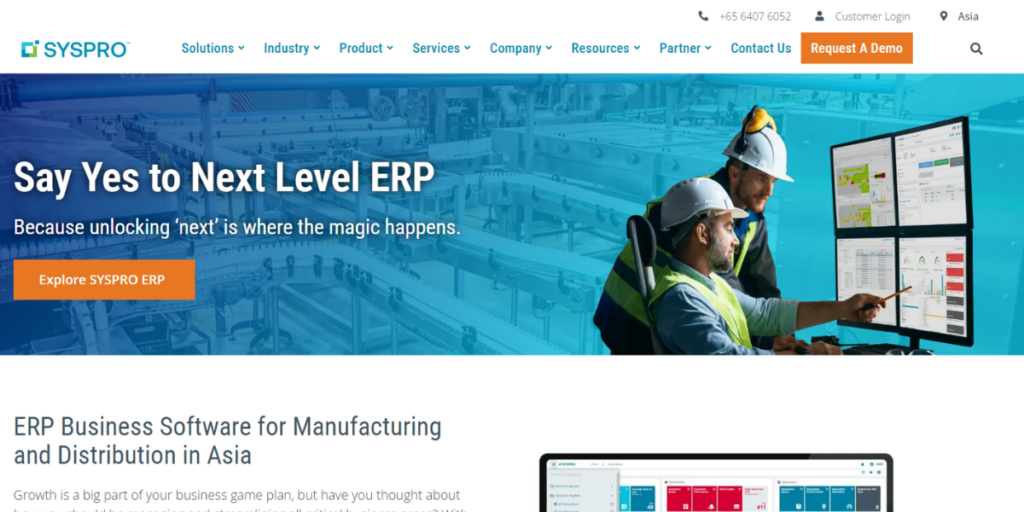
Founded in 1978, SYSPRO is a major global developer of industry-specific ERP software designed to reduce business complexity for manufacturers and distributors. With its beginnings in South Africa, SYSPRO has expanded over the years to support thousands of businesses in 60 countries.
SYSPRO’s software is notable for its modular architecture, which allows firms to modify the system to their own needs while assuring flexibility and scalability. Recent advances include the integration of artificial intelligence and machine learning capabilities, which improve predictive analytics and provide deeper insights into corporate processes. Another outstanding feature is SYSPRO’s “Avanti” – a web-based interface that allows users to access their ERP software from any device, enabling mobility and real-time access to important corporate data.
Key Features:
Industry-built: SYSPRO specializes in production and distribution.
Choice and flexibility: SYSPRO 8 may be deployed on-premise or in the cloud and is accessible through a variety of devices, including the Windows UI, web interface, and mobile platforms.
Enable digital business: Uses evolving technology to rethink and redesign company operations.
Engaging user experience: Offers an engaging, simple system that encourages cooperation and assists users with their daily chores.
Protect ERP investment: Ensures long-term viability by consistently implementing new technologies that improve operational capabilities and increase efficiency.
Pricing:
The system’s cost starts at $199 per user each month. On-premises installations can cost around $12,000. If the system is purchased through a reseller, you may pay additional costs such as consultation and setup fees.
6. Odoo
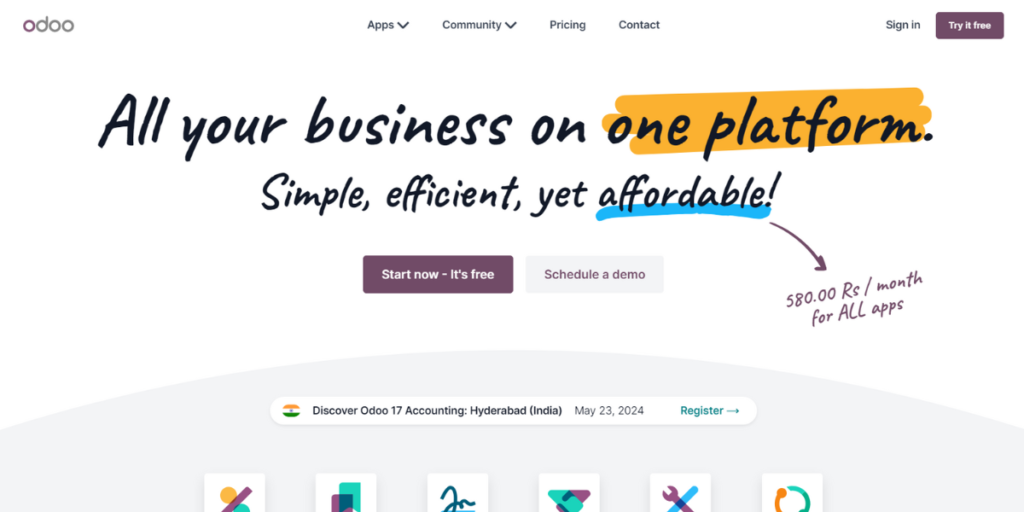
Odoo was launched in 2005 and has since evolved to become a top worldwide open-source ERP supplier. Initially known as TinyERP, it developed into OpenERP before taking on its present moniker. Odoo’s strength is its modular architecture, which has over 10,000 connected apps that cater to a variety of corporate needs. Its most recent features include IoT integration, e-learning modules, and website builders. The platform’s ongoing innovation, fueled by a large community, keeps it at the forefront of business solutions.
Key Features:
Unified experience: Odoo’s suite of integrated apps provides a centralized, online experience that can be accessed from any location or device.
E-commerce: Odoo’s e-Commerce software provides a product catalog as well as product descriptions.
CRM: Visualizes the sales funnel, fresh communications, top opportunities, and predicted revenues to improve customer relationship management.
Inventory management: Uses a double-entry inventory system to provide total traceability of all processes and effective stock management.
Production: Oversees all assembly and production activities, scheduling manufacturing orders and work orders automatically.
Finance and accounting: Provides integrated analytic accounting, budgeting, asset management, and multi-company consolidation to ensure complete financial monitoring.
Pricing:
The standard plan starts at $24.90/user/month (paid yearly) or $31.10/user/month when billed monthly. Supports many apps and comes with unlimited hosting and maintenance.
7. Plex Manufacturing Cloud
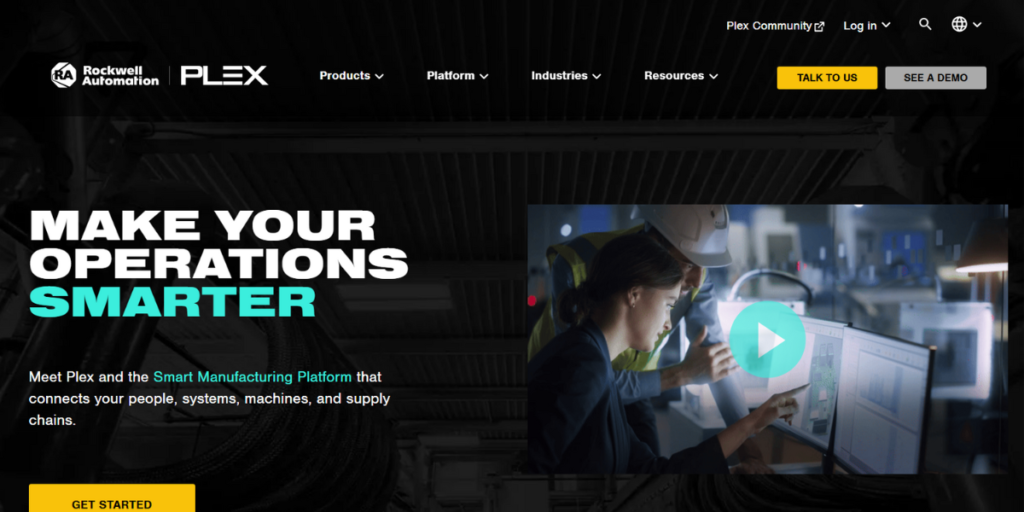
Plex, a pioneer in cloud-based ERP, is disrupting the industry with its revolutionary SaaS strategy. Plex Manufacturing Cloud distinguishes itself by automatically delivering product upgrades and new features, guaranteeing that manufacturers have access to the most recent innovations. This technology enables speedy implementation and allows manufacturers to quickly alter their usage as needed. Plex also investigates cutting-edge technologies such as IoT, blockchain, and AI/ML, which enhances its capabilities.
Key Features:
- Live production tracking
- Streamlined supply chain oversight
- Quality assurance and regulatory compliance
- Seamlessly integrated ERP and MES systems
- Energy efficiency management and sustainability monitoring
Pricing:
The PRicing starts at around $30 per user.
8. Deltek
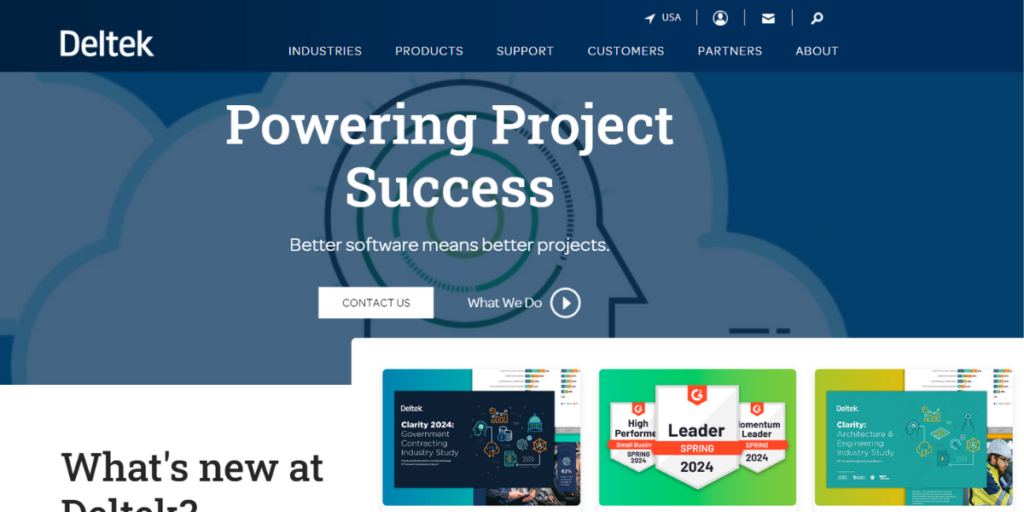
Deltek is a specialist ERP solution designed for architectural and engineering businesses that smoothly integrates project management, financial accounting tools, and business intelligence platforms. Firms benefit from Deltek’s single platform, which promotes smooth cooperation and effective project execution.
Key Features:
- Specialized ERP solutions for project-based industries
- Tailored functionalities for specific sectors
- Advanced project accounting capabilities
- Effective planning and management of resources
- Tools for business development and CRM integration
- Comprehensive compliance and risk management features
Pricing:
The Pricing starts at around $30 per user.
9. Quickbooks
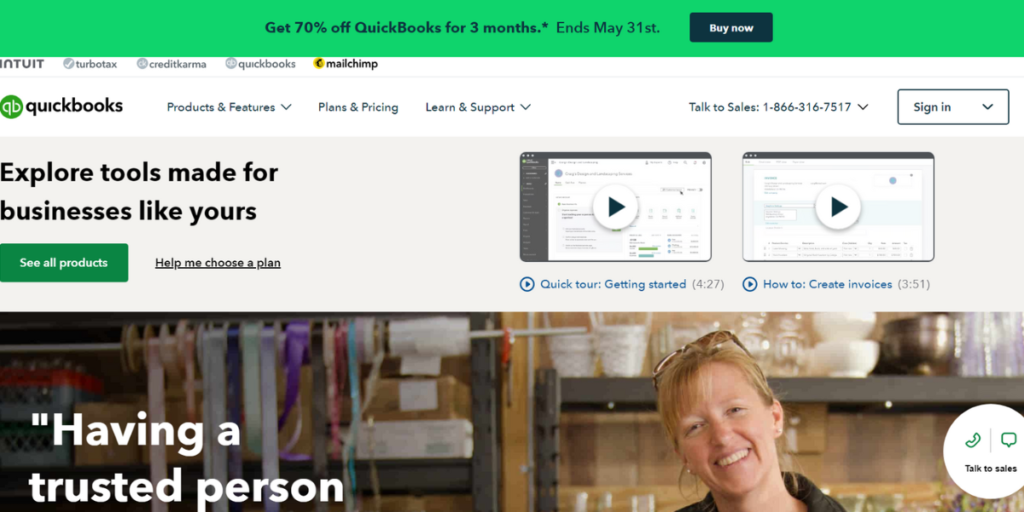
QuickBooks stands out for its user-friendly interface, which supports a variety of job management services such as payroll, inventory, time tracking, taxation, and invoicing. It streamlines spending tracking, cash flow management, and access to reports and receipts from a single place. QuickBooks has a significant benefit in that it is widely used by accountants, making the transfer to this platform simple if you are thinking about outsourcing your accounting system.
Key Features:
- Streamlined bookkeeping and accounting tasks
- Help with tax preparation
- Seamless integration for payroll processing
- Efficient handling of invoices and payments
- Tracking expenses made easy
- Comprehensive reporting capabilities
Pricing:
The projected cost varies from 30$ for simple starting, then another 60$ for essential and 200$ for advance.
10. Acumatica
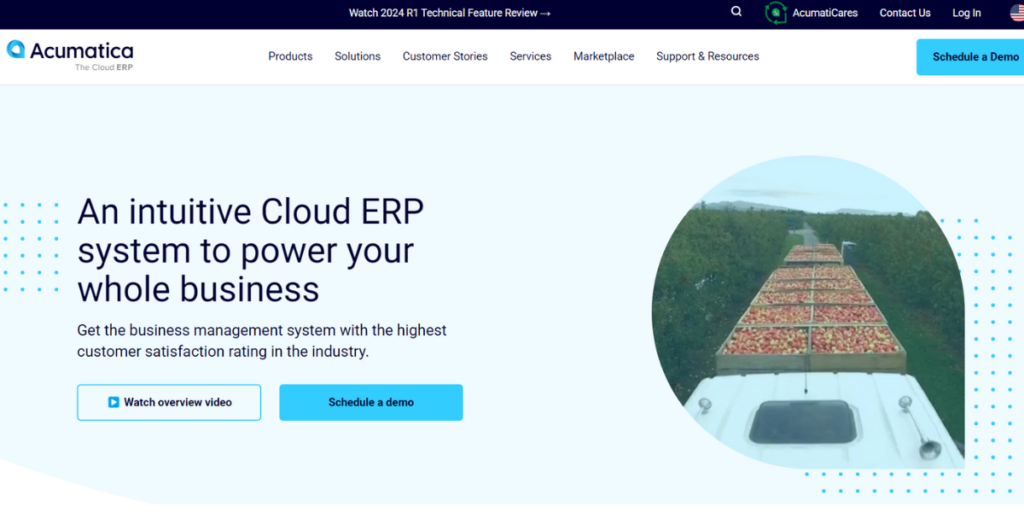
Acumatica is a cloud-based system for finance, planning, buying, and inventory management that provides organizations with complete control. In addition to customer management and human resources, Acumatica provides a wide range of other features. Acumatica Cloud enables businesses to easily sell things online and track payments.
Key Features:
- A cloud-based ERP solution
- Customized industry-specific offerings
- Instant access to real-time data
- Ability to grow and adapt
- Accessible via mobile devices and dedicated apps
- Includes built-in CRM and eCommerce integration
Pricing:
The projected cost approximately starts from $6000.
11. Zoho
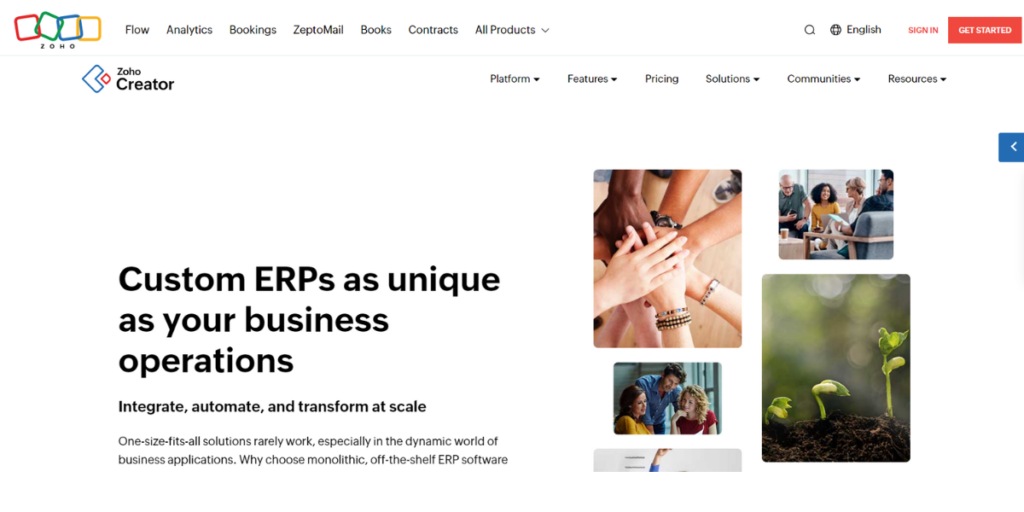
Zoho Finance is an online suite of software that integrates financial activities and simplifies corporate accounting. It provides a full range of tools appropriate for single traders, including everything from invoicing to inventory management, all readily accessible on one platform. Integration with other Zoho products, such as Zoho CRM, improves the usefulness and efficiency of financial procedures. Within the Zoho Finance umbrella, applications such as Zoho Books and Zoho Invoice offer practical solutions for double-entry accounting and invoicing operations.
Key Features:
- Collection of financial applications within a unified platform
- Automated processes for streamlined workflows
- Personalized invoices and templates
- Incorporated analytics for insights
- Support for multiple currencies and languages
- Secure online transactions for peace of mind
Pricing:
The projected cost approximately starts from $249.
12. Freshbooks
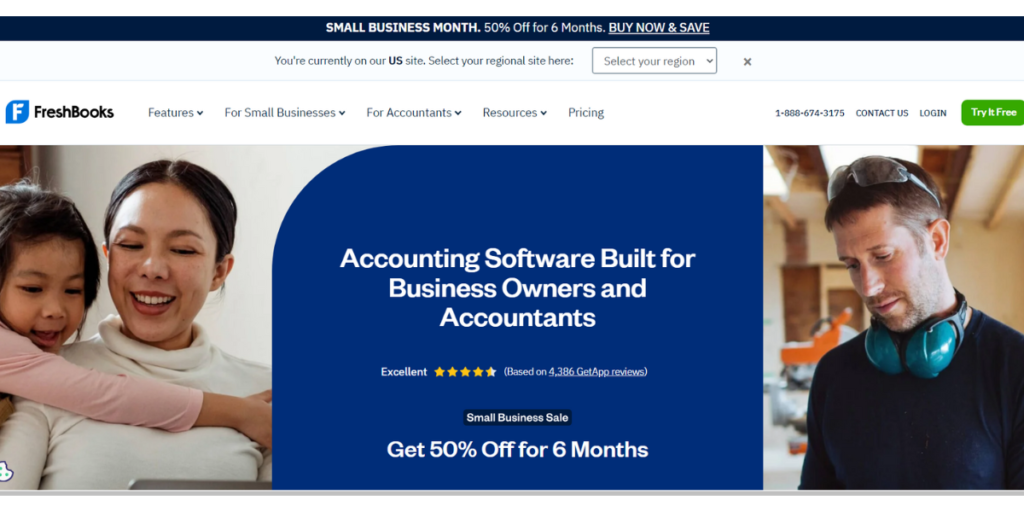
FreshBooks is an online platform designed to streamline invoicing, bookkeeping, and time-tracking for businesses. It’s particularly beneficial for freelancers, professionals, accountants, and employees alike. With FreshBooks, you can effortlessly create and send invoices, process payments, and monitor your time. The software offers clients various payment options, including card payments, and enables you to send reminders to customers for overdue payments.
Key Features:
- Easy-to-use invoicing and billing features
- Expense monitoring capabilities
- Tracking of time spent
- Tools for managing projects
- Automatic tax calculation
- Availability of a mobile application
Pricing:
The projected cost approximately for the lite version starts from $7.60/month.
For the plus version it is $13.20/month and for Premium Version it is $24/month.
Conclusion
Choosing an appropriate ERP software involves more than just streamlining processes or automating jobs. It’s important selecting a system that meets your business objectives, develops with you, and keeps up with market developments. A strong ERP solution may significantly increase your organization’s efficiency, production, and creativity.
When considering ERP alternatives, consider future ambitions as well as present demands. Consider the software’s adaptability, amount of customer support, integration with other systems, and possible ROI. Remember that an ERP system is more than simply a tool; it is a long-term collaborator in your company journey. By devoting time to study, getting guidance, and meditating on your requirements, you can confidently select an ERP system that will move your organization ahead.
FAQs
The following are few of the popular ERP Softwares:
- Acu Process Manufacturing
- Acumatica Cloud ERP
- Administrator Plus
- AcctVantage ERP
ERP systems are complete solutions that connect and manage fundamental business activities, simplifying data and processes throughout the enterprise. They are adaptable and may be utilized in a variety of areas, including human resources, sales, logistics, and others. ERP systems can manage a huge number of tasks at once and frequently contain extra functions such as marketing automation and customer service desks.
HR departments use integrated software solutions to boost staff productivity, which include ERP modules for duties like recruiting, application tracking, basic HR services, and performance management tools.
